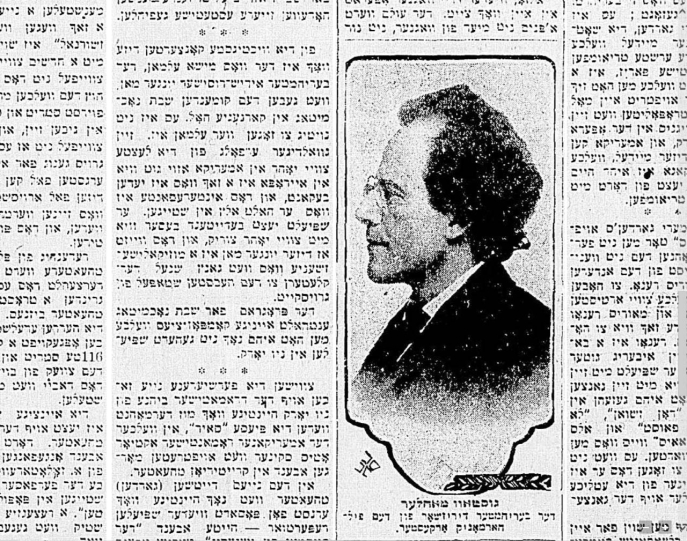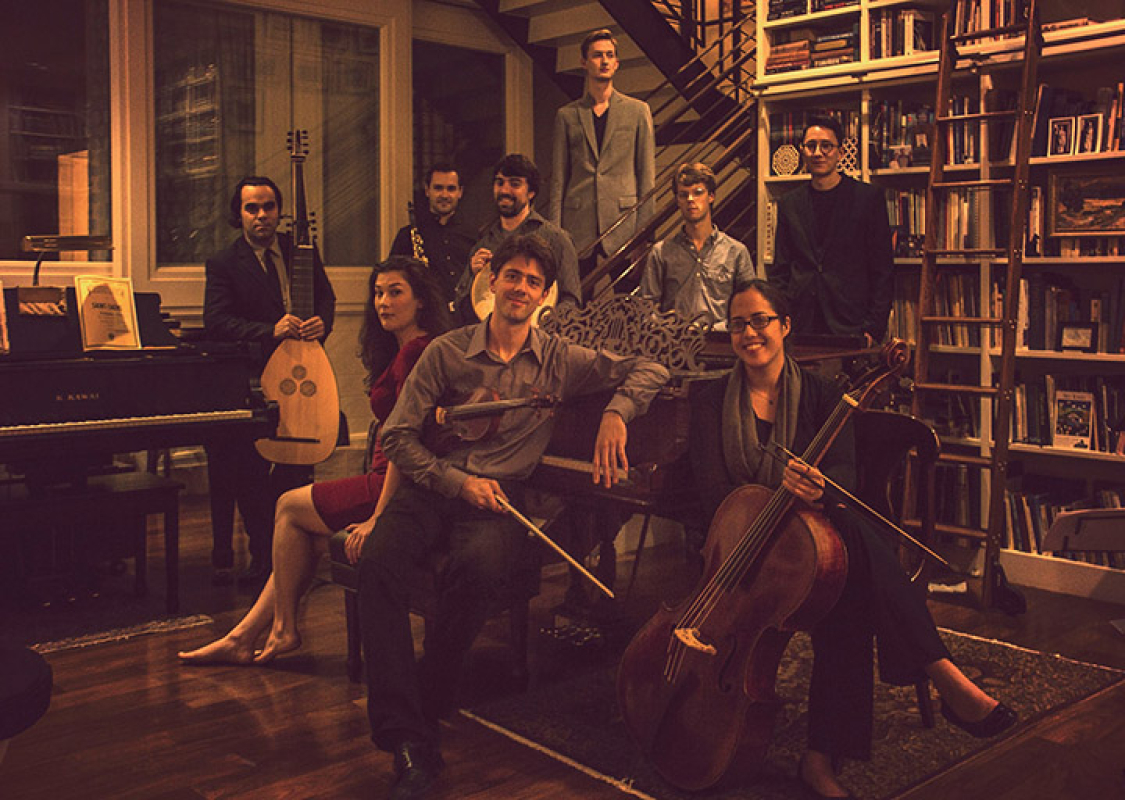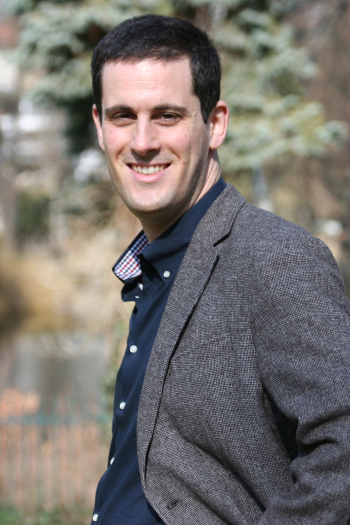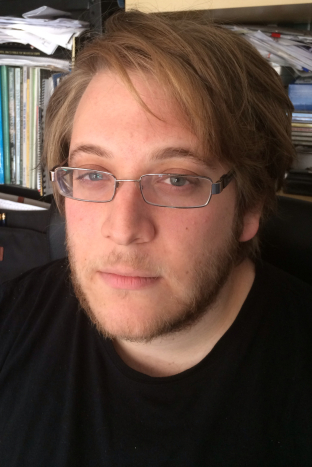Cantata Profana performs Gustav Mahler’s 'Das Lied von der Erde'

|
Sidney Krum Young Artists Concert Series
6:00pm Pre-Concert Lecture 7:00pm Concert The Sidney Krum Young Artists Concert Series is made possible by a generous gift from the Estate of Sidney Krum.
This program is supported, in part, by public funds from the New York City Department of Cultural Affairs, in partnership with the City Council. Admission: $25
|
6:00pm Pre-Concert Lecture
2nd Floor Kovno Room | Sponsored by the Jewish Music Forum
Gustav Mahler:
Jewish Identity and Nineteenth-Century Musical Culture
Dr. Daniel Jütte (NYU)
7:00pm Concert
Auditorium
For this program YIVO joins forces with the young, “intrepid” (New Yorker) vocal and instrumental chamber ensemble Cantata Profana to present Gustav Mahler’s epic song symphony, Das Lied von der Erde (The Song of the Earth) in Arnold Schoenberg and Rainer Riehn’s chamber orchestra arrangement. The program places this work in the context of its German and Jewish milieu pairing it with short works by Arnold Schoenberg, Johann Strauss II, Giacomo Meyerbeer, and Louis Lewandowski, as well as a new work by composer Alex Weiser. Alex Weiser will introduce the program with a brief discussion of Mahler’s Jewish identity, both from Mahler’s perspective and from that of those around him.
Listen to Cantana Profana’s podcast featuring Alex Weiser.
About the Participants

Cantata Profana is a fearless vocal and instrumental chamber ensemble now entering its sixth season of presenting “every kind of classical music you might imagine” (New Yorker). The ensemble is devoted to new music, old music “to most anything, so long as the mixture is put together thoughtfully and put across persuasively” (NY Times). Cantata Profana’s artists combine virtuosic talent with innovative staging, lighting, and design, collaborating to present eclectic and diverse masterpieces with a theatrical flair. We transcend the typical chamber music concert with programming that pulls from every century, allowing pieces to speak to each other across time periods and continents, just as the performers speak to the audience. Each concert offers a never before imagined way of telling stories through music.
In demand across the U.S. and abroad as soloists and chamber musicians, our core artists continue to create some of their best work in their performances with Cantata Profana. We have performed in venues all over New York City, such as Joe’s PUB, Symphony Space, Roulette, Dixon Place, Issue Project Room and the Baruch Performing Arts Center. Cantata Profana has also recently traveled to Avaloch Farm Music Institute in New Hampshire, the Banff Centre in Canada, Connecticut’s Music Mountain, the Princeton Sound Kitchen, and Boston’s Goethe-Institute.
Toggling between our Mainstage productions, smaller Spotlight Series concerts by our core artists, and collaborations with our sister company Heartbeat Opera, Cantata Profana presents an almost gluttonous range of music each season.

Daniel Jütte is a historian of early modern and modern Europe. He is an associate professor in the Department of History at New York University. His research interests lie in cultural history, urban history and material culture, history of knowledge and science, and Jewish history. He is currently working on a history of transparency from antiquity to modern times.
Jütte is the author of two monographs. His award-winning The Age of Secrecy: Jews, Christians, and the Economy of Secrets, 1400–1800 (Yale University Press, 2015; first German ed. 2011) offers a general history of secrecy in the early modern period, with particular attention to the role of secrecy and secret sciences in Jewish-Christian relations. His second book, The Strait Gate: Thresholds and Power in Western History (Yale University Press, 2015), explores how doors, gates, and related technologies such as the key and the lock have shaped notions about security, privacy, and shelter.
Before joining NYU, Jütte taught as lecturer in the History Department at Harvard University as well as at the University of Heidelberg, from which he earned his Ph.D. in 2010. He has also held a number of fellowships: Junior Fellow in the Harvard Society of Fellows (2011–2015); Fellow at the Wissenschaftskolleg, Berlin (2015–16); and Eurias Fellow at the University of Cambridge (2016–2017). In addition, his work has been supported by the German Research Foundation (DFG), the German National Academic Foundation (Studienstiftung), and the Daimler Benz Foundation.
Jütte has been recognized for excellence in teaching, but he also enjoys engaging non-academic audiences and readerships, e.g., as a contributor to media networks (such as the BBC and Deutschlandradio) and major daily newspapers, including the Frankfurter Allgemeine Zeitung, Neue Zürcher Zeitung, Süddeutsche Zeitung, and Die Welt.

Broad gestures, rich textures, and narrative sweep are hallmarks of the “compelling” (New York Times), “shapely, melody-rich” (Wall Street Journal) music of composer Alex Weiser. Born and raised in New York City, Weiser creates acutely cosmopolitan music combining a deeply felt historical perspective with a vibrant forward-looking creativity. Weiser has been praised for writing “insightful” music “of great poetic depth” (Feast of Music), and for having a “sophisticated ear and knack for evoking luscious textures and imaginative yet approachable harmonies” (I Care If You Listen).
An energetic advocate for contemporary classical music and for the work of his peers, Weiser co-founded and directs Kettle Corn New Music, an “ever-enjoyable,” and “engaging” concert series which “creates that ideal listening environment that so many institutions aim for: relaxed, yet allowing for concentration” (New York Times), and was for nearly five years a director of the MATA Festival, “the city’s leading showcase for vital new music by emerging composers” (The New Yorker). Weiser is now the Public Programs Manager at the YIVO Institute for Jewish Research where he curates and produces programs that combine a fascination with and curiosity for historical context, with an eye toward influential Jewish contributions to the culture of today and tomorrow.





